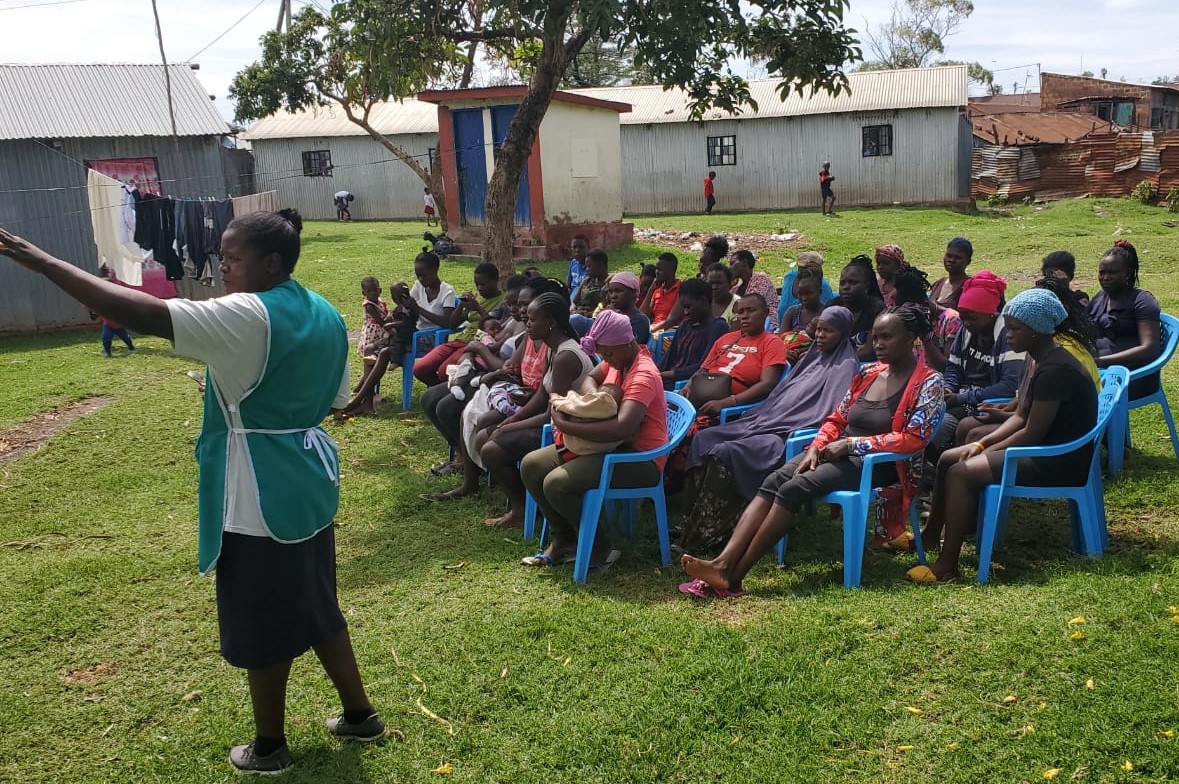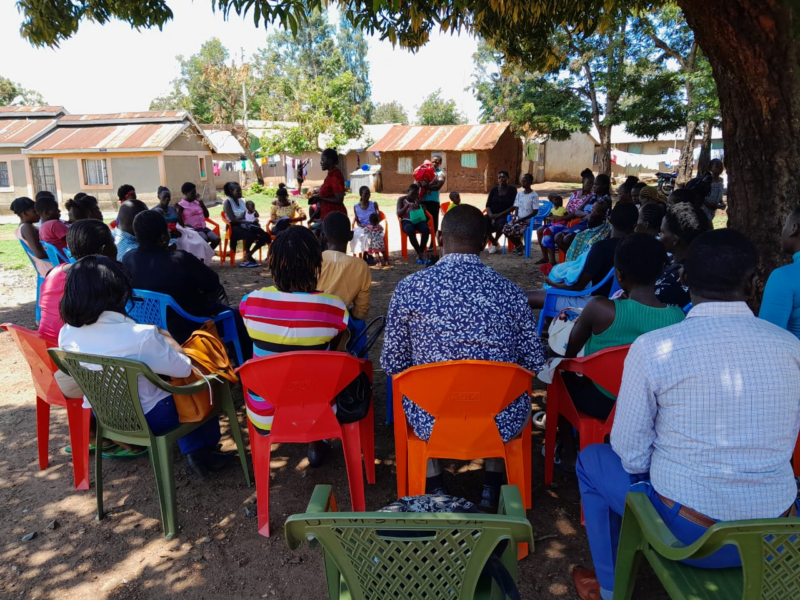
It’s about 10:30 a.m. on a Tuesday morning, and residents of the neighborhood are gathering at a local church in Dunga, Kisumu Central, for a community health meeting. Our project team is met by a nurse from one of the Community Level II health centers, a Community Health Assistant (CHA), and some Community Health Volunteers (CHVs). Once inside the church, we take our seats to join the community members, comprising mostly of women, and a few men. At about 11:00 a.m., the meeting begins with a welcome, a prayer, and introductions.
This meeting is one of the community dialogue sessions that the Revive-IPTp project, led by Population Council-Kenya, is facilitating in two sub-counties, Kisumu Central in Kisumu County and Suna West in Migori County, two highly endemic malaria counties in Kenya. The sessions engage the community on malaria in pregnancy (MiP) and the use of sulfadoxine-pyrimethamine (SP), also known as Fansidar, for intermittent, preventive treatment of malaria in pregnancy (IPTp) as recommended by the World Health Organization’s guidelines on IPTp. SP is a safe, clinically proven preventive treatment and is given to pregnant women in areas of moderate-to-high transmission, ideally by directly observed therapy (DOT), at each monthly antenatal care (ANC) visit beginning in the second trimester.
The sub-county malaria coordinators, the community health team, the Revive IPTp project team, and the residents of Kisumu Central and Suna West organize the dialogues as a team effort. To ensure attendance, the community is informed of the dialogue a few days in advance with CHVs mobilizing the pregnant women under their care. These dialogues are held with the aim to:
- Engage the community on the importance of their health and encourage them to seek health care services, including antenatal care;
- Build awareness about malaria as a disease and the benefit of using IPTp-SP to prevent malaria in pregnancy; and
- Understand the challenges faced by the community in accessing health services and pregnancy-related care, especially SP for IPTp, and discuss feasible approaches to addressing these challenges.
After the introductions, the nurse gave a talk about health, pregnancy, the importance of seeking antenatal care, malaria in general, malaria in pregnancy, and how to prevent it using SP or Fansidar. She then invited the community members to share their views.
Perceptions on Seeking Health Information and Services
Community members appreciate receiving health information during these dialogues, but it is not something they seek out at the facility. “It is good to bring this information closer to us, if we are not sick, we usually see no need to go to the hospital. It’s hard to get the information from the facilities, the health workers are very busy. Sometimes we don’t have the money or the time to go to the hospitals. Sometimes we may go there and find the facilities closed or with no staff, especially in the afternoons and at night. But these meetings help us see the importance of our health and where and when to seek services. We also get answers to our questions.,” said many of the members.
These challenges become barriers to accessing and taking up services like IPTp-SP. Community dialogues and outreaches that take important health information and integrated health services, including IPTp-SP, into the community settings, help build awareness about important preventive health care and have the potential to increase the desire and demand for such services.
Many mothers hear about IPTp-SP for the first time during our dialogue meetings. “We didn’t know about it,” some say, while others report that, “I was told the drug has many side effects.” These meetings help reinforce the importance of taking SP during pregnancy and correct any misinformation about the drug. The new mothers also get linked to a CHV who then follows up with them after the dialogues for further ANC attendance and SP uptake.
Drug and commodity shortages are a commonly reported problem. “One of the biggest problems we face is that many times the drugs are not available at the facilities, especially at the lower level. We may not have the money to buy them from the drug shops or the time and money to go to the bigger facilities, which are usually further away from us. In these meetings, we usually get informed about the planned community outreaches through which we can get free SP, other drugs, and other services such as bed nets. We also get information on when the next stocks may be coming, and which centers may be having drugs.” Taking this feedback from the community back to the health management and planning authorities provides an opportunity to address existing gaps in commodity and drug stocks, and may improve forecasting, planning, and budgeting processes.
Negative perceptions of health workers’ attitudes are a common complaint. Many in the audience said that “We also come to talk about the problems we face while at the facilities. Long queues, health workers who are harsh, and not getting the treatment we have gone for all discourage us from seeking services. We request that this information be taken back to the facility managers, maybe some improvements will be made.” There is a clear need for training and incentivizing health workers to deliver friendlier care if the communities are to seek and take up services.
The roads are narrow and winding and get muddy during the rainy seasons in some of the communities. Some of the women fear falling off “bodabodas,” a local name for motorbikes, the main mode of transport for the poorer population. “I fear falling off the bike, so If I am not sick and the road is muddy, most likely I will not go to the facility for SP. But if I understand the benefit for me and my baby, I’ll do my best to go,” said some of the mothers. This speaks of the importance of communicating the dangers of malaria in pregnancy and the benefit of SP so that mothers find it worthwhile to go for it, even amid the transportation challenges they face. It also further reiterates the need for taking services closer to the communities to reduce the barriers to access.
 Community dialogue in Kilo 1 community, Nyalenda, Kisumu.
Community dialogue in Kilo 1 community, Nyalenda, Kisumu.
Credit: Joshua Adhola and Zoe Nakuya, for Revive-IPTp project
Men’s Involvement in Antenatal Care
The involvement of men in seeking care for themselves and for their families remains a challenge. Some of the men who attend these dialogues say, “We see these meetings as meetings for women; other areas of health should also be discussed so that we as men can also benefit from them. We also must work to provide for the family, maybe if there is some allowance given at these meetings, we shall come. The health workers could also arrange meetings for just the men’s groups, like where we gather for work or social activities.”
Some shared that, “When I ask my wife about what she does at the hospital every month and why she swallows medicine even when she is not sick, I don’t get enough information from her; so I come to these meetings to get more information from the health workers and the other members. Now I understand that these matters concern me too, so I can support her better.” Many men in the dialogues shared these sentiments. Some of the women say that these meetings enable them to understand health matters better, empowering them to share the information with their men. However, they still feel that their partners should be encouraged to attend these health discussions and get detailed information for themselves.
It is evident that many of the men, especially the older ones, being the main gatekeepers of resources and decisions for their families, are interested in supporting their women if they know the importance of their involvement. If the process of involvement is made more accessible to them in ways that don’t compromise their other priorities and obligations, they will be more likely to attend.
Young women’s experiences
Some of the meetings are comprised of younger pregnant women, mostly in their teens. These women are less aware of pregnancy-related health risks, and those related to malaria in pregnancy. “I was not aware of the health risks that I face when pregnant or that malaria can affect or kill my baby; I thought it affects only me. Sometimes we don’t have information because we fear to go to the hospitals to get it. When you are young and you get pregnant, you get harsh treatment from most people, even at the health facilities; we go there only if we need to,” were sentiments echoed by many young women.
In gatherings with younger women, there is a noticeable difference in the composition of participants; fewer men show up. “It is difficult to talk to our men about our pregnancies, we feel that it is our issue, and they too feel that way. Sometimes we don’t know how to explain these health matters well. Sometimes we tell the men, but they don’t listen to us. The health workers should talk to the men, preferably in a separate meeting for men,” said many of the women.
These young women are less literate about health matters, feel intimidated in seeking support from their partners, and feel stigmatized by the older members of the community. Meetings like these provide these women with some education and empowerment about their health and pregnancy, providing answers to some of their questions in a more friendly and peer-supported environment. Designing responsive interventions that are delivered in environments that don’t intimidate younger women can improve demand for and access to services for young women.
Paradoxically, many of the younger women share that much as they would like to be supported by their men, they don’t want their male partners to escort them to the health facilities. “It is not easy to get any money from our husbands, except when we are pregnant; and some of us don’t work. If they escort us, they’ll find out that some of the health services are free or cost less than what we ask for. So, they’ll give us little or no money.” For many of these young women, it is when they are pregnant that they can get financial support from their partners, and yet when the men become aware that some of the health services are free, they hold back financial support. This speaks to the need for economic empowerment interventions for women and girls in low resource settings so that pregnancy is not seen as a means of survival or escape from poverty.
The Takeaway
Community engagement can bridge the demand and uptake for IPTp-SP and help government authorities reach zero malaria.
Community members know their needs, challenges, and priorities. Their involvement in identifying the challenges and contributing solutions builds ownership, empowerment, and self-care capacity among the community. This has the potential to sustainably catalyze self-driven decisions and proactive actions to demand and seek for health care services, including IPTp-SP.
Community engagement in settings over which the community members have some level of control allows for more transparent feedback about health services and providers, which may improve provider accountability and service delivery in the health system.
The community approaches of the Revive-IPTp project empowers mothers in Kisumu Central in Kisumu, and Suna West in Migori, to seek and take up IPTp-SP services and contributes to government efforts to reduce malaria-related morbidity among pregnant women. Learnings from these two sub-counties will contribute toward informing policy and investment decisions for the interventions in other malaria-endemic counties and the region.

